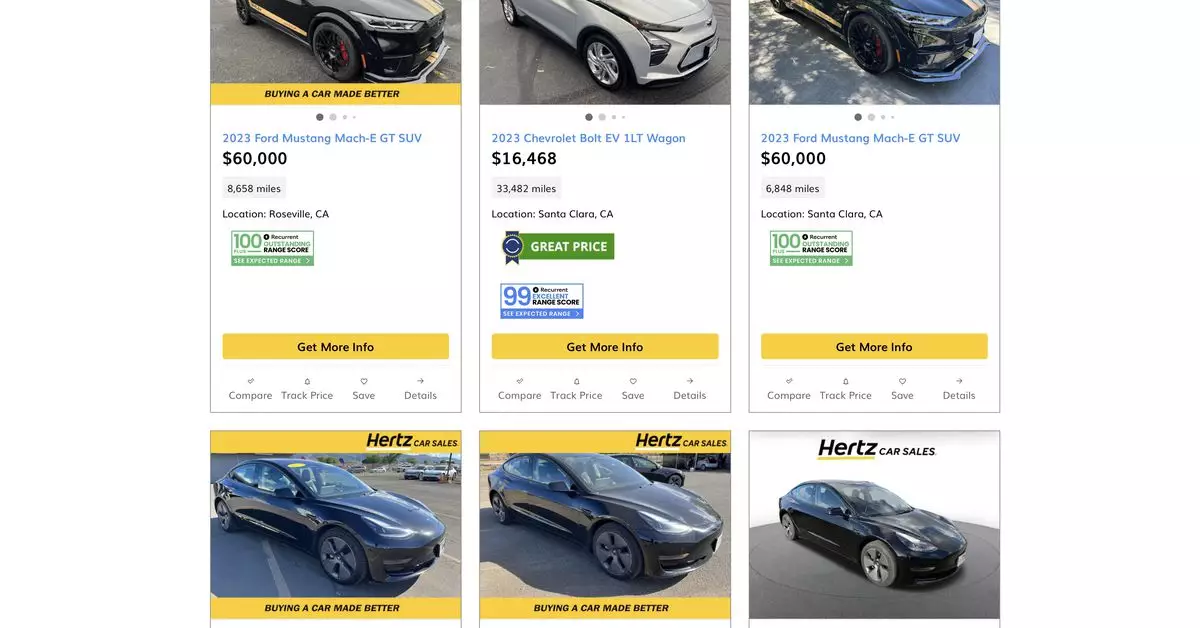In an intriguing shift within the rental car industry, Hertz has adopted a new approach to its electric vehicle (EV) rentals by offering customers the chance to purchase the vehicles they previously rented. This initiative appears targeted toward maintaining customer engagement while simultaneously addressing surplus inventory issues linked to their electric fleet. Offering customers the option to buy their rented Teslas or other electric models not only gives Hertz an edge in the market but also caters to a growing demographic keen on sustainable transportation.
Unique Offers and Customer Experiences
Reports from various renters suggest that the pricing Hertz is offering is surprisingly competitive, especially for vehicles such as the 2023 Model 3 and Chevy Bolt. A Reddit user detailed their experience, stating that Hertz proposed a purchase price of $17,913 for a Tesla Model 3, a figure that closely aligns with current pricing on Hertz’s own sales platform. This kind of personalized offer could appeal significantly to those who have experienced the vehicle firsthand and favor the convenience of a seamless transition from rental to ownership.
Moreover, the competitive pricing extends beyond Teslas. Another renter reported an offer for a 2023 Chevy Bolt at $18,442, while a third individual renting a Polestar 2 received a proposed price of $28,500. By lowering the barriers to purchase, Hertz invites a unique opportunity for renters to embrace electric mobility without the traditional pressures associated with automobile purchase decisions.
In addition to the attractive pricing, Hertz’s initiative also includes a limited 12-month, 12,000-mile powertrain warranty, alongside a buy-back offer within seven days. Such policies help mitigate potential buyer apprehensions and establish trust in a market that can sometimes be wary of purchasing used vehicles. These guarantees reflect an understanding of consumer needs, particularly in a segment that often demands assurance regarding vehicle reliability and performance.
Despite this innovative sales strategy, Hertz’s broader ambitions in electrifying their entire rental fleet reveal a complex reality. Last year, the company scaled back its plans due to a lack of customer demand and repair challenges facing certain EV models, notably the Tesla Model 3. This led to an announcement in February that Hertz would cease acquiring Polestar 2 vehicles altogether. The decision to sell off 30,000 Teslas reflects an acute awareness of market dynamics, suggesting that while consumer interest in EVs is growing, practical challenges remain.
In this context, Hertz’s new sales initiative can be seen as a dual effort: mitigating the pressures of a shifting rental fleet while also cultivating a more engaged consumer base committed to the EV lifestyle. As the world progressively shifts towards electric mobility, such strategies can fortify Hertz’s market position, potentially enhancing both brand loyalty and financial stability in an increasingly electrified automotive landscape.
Hertz’s initiative not only provides an avenue for promoting electric vehicle ownership but also underscores the ongoing evolution of consumer preferences in the automotive sector. This strategic pivot may very well be a model for others in the industry to emulate as they navigate the complexities of transitioning to a more sustainable transportation system.


Leave a Reply